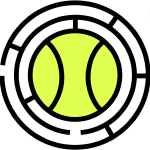No one feels good losing, not a close match, not the opponent played really well today schpiel, and definitely not when losing after a big lead. Lose enough times doubts start moving in and confidence gets shattered. It clouds the mindset and it is difficult to stay positive.
When you’re around tennis long enough you get to see and experience all sorts of emotions; the good, the bad; the indifferent. As daunting as losing may sound, dealing with injuries takes it to a different level on the mind game. The management of handling injuries during and after the injury plays a pivotal role in the speed of which the player returns to their level of tennis quickly or dreads on with despair.
If you want to help your star athlete to rebound back quickly from their injury below are some strategies that have been tried and true. Please keep in mind that these strategies do not override the physician’s protocol.
- Mental work. Research has shown that meditation and visualization can help with performance. More and more players are utilizing these tools as part of their training routine. With free access to youtube and live streaming, replays and live matches are readily available any time. Watching and studying the game is a good learning tool to develop tactics and strategies.
- Keep active. One of the common mistakes I see parents do when their star athlete is injured is having them stay at home and “rest” for an extended period of time. And when the athlete finally gets back on the court, it takes several weeks more to get back on track because they haven’t done much physically. Depending on the severity of the injury and the healing stage, here are some strategies to stay active. If it’s the upper body that is injured, work on the lower body. Build up the endurance on a stationary bike. Swim. Strengthen hip flexors. Do core work, etc, etc. If it’s the lower body that is injured, work on the upper body with strength training. Sit in a chair to hit balls like former ATP world #1 ranked Thomas Muster. There are always strategies to keep training. The point is, keep your child active. Because if they don’t, they will feel absolutely miserable physically and mentally when returning to the courts.
- Stay motivated. Tennis is a great sport but man does it put tremendous demands on the body. There is no point in griping how unlucky to be injured. It is what it is. The best that you can do is to help your star athlete to do all the necessary preparation for a strong return to the courts. Understand this, it’s not IF they will get injured, it’s WHEN they get injured, what are they going to do to get back? Help your child to stay positive. To stay on track with their goals.
- When to return to competition. More often than not players return too early to competition finding themselves having to take more time off. They are anxious to get back quickly because they feel like they’re missing out on the points, the ranking, blahblahblah. Here’s a checklist to determine when it is safe to return to competition. 1) Is she able to train full out for the entire duration of the training every day for a whole week and pain-free? 2) Is he able to play several practice matches in a row and pain-free? If there is even a hint of pain, don’t do it. Resist the temptation to push it through. Take all the time they need. It will turn out to be faster than having relapses.
I know it’s hard to watch others competing and gaining points from the sideline but to return to competition even with a slight pain, the injury looms in the mind and it will hinder the confidence capacity. The stress of competition is hard on a healthy body as it is and it’s merciless on a vulnerable one. There is always a tournament next week, and the week after, and the week after that. Stay away from the rat race.
Best of luck this week.
Yours Truly,
Patricia


